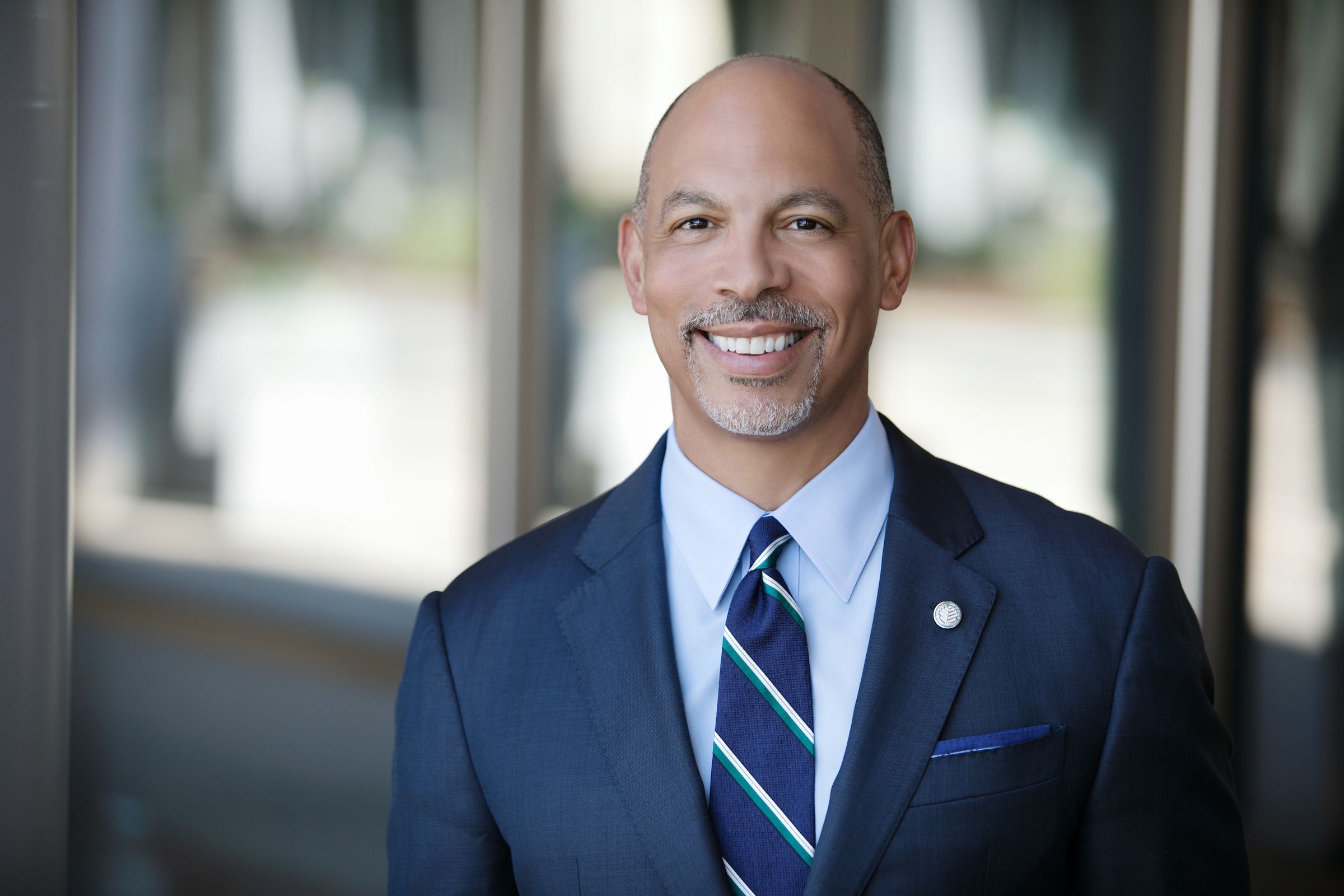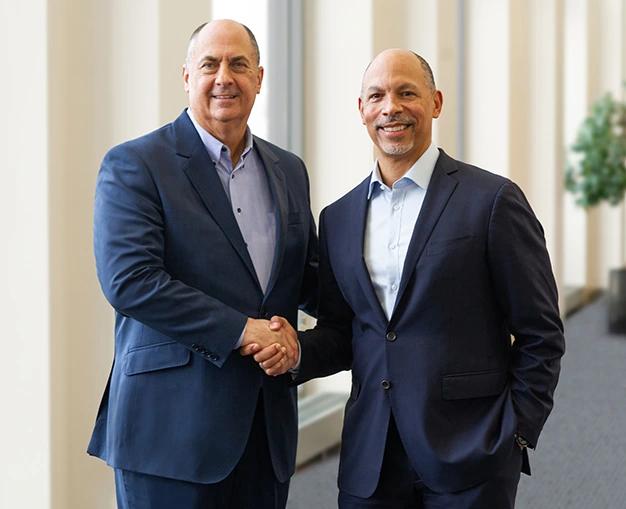Atrium Health, Advocate Aurora Health complete merger, and more hospital deals could follow
The systems say they have now formally merged to create Advocate Health, forming one of America’s largest hospital systems. Analysts have said it could pave the way for more consolidations.
Atrium Health and Advocate Aurora Health say they have completed their merger. The new system will be known as Advocate Health and will operate 67 hospitals in six states, and it has a combined $27 billion in annual revenue.

Atrium Health and Advocate Aurora Health say they have completed the merger of the two health systems, concluding one of the hospital industry’s most watched deals and potentially setting the stage for more consolidations.
Eugene Woods, CEO of Atrium Health, becomes co-CEO of the new Advocate Health.

The two organizations issued a joint statement Friday saying they have formally combined to create a new system called Advocate Health.
The newly merged system organization becomes one of America’s largest nonprofit hospital systems. The new Advocate Health boasts a combined $27 billion in annual revenue with about 150,000 employees, and the merged system operates 67 hospitals in six states. They first announced their intentions to merge in May.
Jim Skogsbergh, CEO of Advocate Aurora Health, will serve as co-CEO of the new Advocate Health for 18 months, and then plans to retire.

“Powered by 150,000 teammates – including the best and brightest physicians, nurses, researchers and faculty – we are poised to push past traditional geographic and care delivery boundaries to create a healthier tomorrow for all,” Eugene A. Woods, chief executive officer of Advocate Health, said in a statement.
Woods had been CEO of Atrium Health. Wood and Jim Skogsbergh, the CEO of Advocate Aurora, will serve as co-chief executive officers until Skosbergh retires in 18 months.
“We couldn’t be more pleased to bring our organizations together to do more, be better and go faster to help more people live well while training the next generation of health care professionals,” Skosbergh said.
Advocate Health is going to be headquartered in Charlotte, North Carolina, while the organization said it will maintain a strong presence in the Chicago and Milwaukee areas. The new system is planning to build a new institute focused on health equity in Milwaukee.
The Atrium Health, Advocate Health Care and Aurora Health Care brands will continue to be used in their local communities, officials said. The Wake Forest University School of Medicine will serve as “the academic core” of the organization, the system said.
Concerns about the merger
A spokesman for Advocate Aurora said via email Saturday that the systems have taken all the necessary steps needed for regulatory approvals.
North Carolina Attorney General Josh Stein said Thursday that his office won’t be opposing the deal, the Winston-Salem Journal reported. In a statement, Stein said “my office has conducted a thorough review into this transaction and concluded that there is no legal basis to prevent it.”
“Therefore, the state will take no further action,” he said.
However, Stein said, “I am concerned about this combination’s possible effects on health care access in rural and urban underserved communities.”
The planned deal has drawn some scrutiny. North Carolina State Treasurer Dale Folwell said Friday, “I have deep concerns about this merger.” Folwell said Atrium is “notorious for its aggressive medical debt collections”, and noted Advocate Aurora has been sued for allegations of anticompetitive behavior.
Folwell said he worries about the impact of the deal for consumers. “There is widespread evidence that mergers make hospital care less affordable and less safe,” he said.
The merger hit a setback in September with a key regulatory board in Illinois. The Illinois Health Facilities and Services Review Board initially voted against the deal in September, but then reversed course and allowed the systems to present more information for more consideration. The Illinois board signed off on the deal in November, The Chicago Tribune reported.
The Federal Trade Commission has applied more scrutiny to hospital consolidations, and some systems have abandoned planned deals due to regulatory opposition. The FTC has taken action on deals involving systems in overlapping markets, saying the deals would lead to higher prices and reduced services for consumers. President Biden signed an executive order in July 2021 directing regulators to closely examine mergers, including hospital consolidations, to be sure they don’t hurt consumers.
However, the Atrium-Advocate merger involves two systems operating in very different markets, thus avoiding a concern of regulators about reduced competition in overlapping or adjacent markets. Atrium, based in Charlotte, runs hospitals and care sites in North Carolina, South Carolina, Georgia and Alabama. Advocate Aurora, with corporate offices in Downers Grove, Illinois and Milwaukee, Wisconsin, operates in Illinois and Wisconsin.
Jim Skosbergh, left, and Eugene Woods, will serve as co-CEOs of the new Advocate Health.

More deals coming
Analysts said the Atrium-Advocate Aurora merger could spur other health systems, including larger systems, to pursue similar mergers. The deal sets a model for other transactions by partnering with systems in other areas, as opposed to trying to form a deal with an organization in the same region and risking regulatory opposition, analysts say.
Kenneth Kaufman, managing director and chairman of Kaufman Hall, a healthcare consulting firm, said he expects to see more mergers and acquisitions. Kaufman Hall advised Atrium Health and Advocate Aurora Health in their plans to merge.
“I’d be really surprised if this is a one-and-done deal. I think we’ll see a handful of these other transactions,” Kaufman told Chief Healthcare Executive in May.
“The reason this deal is so important is it addresses really critical healthcare decisions coming out of the pandemic,” Kaufman said.
“Healthcare is no longer a solely community-based product,” he continued. “It’s a series of really hard problems and trying to create an organization with the size and scale and intellectual capital to solve those problems.”
When Atrium and Advocate Aurora first announced their intentions to merge, Woods said one of the driving factors among the organizations is, “We change before we have to.” Both systems have said they are focused on improving health equity in the deal and aim to expand access to healthcare in urban and rural areas.
The last two years have seen fewer hospital mergers, as hospital officials have been consumed with the COVID-19 pandemic and have had less time to devote to long-term planning. In 2021, there were 49 hospital mergers and consolidations, compared to 79 the previous year, according to Kaufman Hall. In the first half of 2022, there were 25 hospital transactions announced, roughly matching the slower pace of 2021.
However, there are signs that the pace of hospital deals is starting to pick up. Intermountain Health completed its merger with SCL Health this year. Trinity Health, one of America’s largest Catholic systems, completed its acquisition of MercyOne, an Iowa-based system, in September.
More deals have been announced in the fall. Gundersen Health System and Bellin Health completed their merger last week. The new system will operate 11 hospitals and more than 100 clinics serving patients in Wisconsin, Michigan, Minnesota and Iowa.
Essentia Health and the Marshfield Clinic Health System said in October that they have signed a memorandum of understanding to examine the possibility of creating a regional health system. If they move forward, the combined system would operate 25 hospitals in Minnesota, North Dakota, Wisconsin, and Michigan.
LCMC Health announced in October it has struck a deal to buy three hospitals in the New Orleans area from HCA Healthcare. Yale New Haven Health System said it has reached an agreement to buy two Connecticut health systems, including three hospitals, from Prospect Medical Holdings.
The prospect of more hospital mergers worries some critics. Michael Abrams, a managing partner of Numerof & Associates, a consulting firm, told Chief Healthcare Executive in July that he feared the Atrium-Advocate Aurora deal would drive other systems to pursue similar deals, and consumers would pay the price.
“The end game is we get to a relatively small oligopoly of healthcare systems that provide care to the majority of citizens in this country,” Abrams said. “They are too big to fail, and too big to care.”
Analysts say some systems may be looking to pursue mergers to find opportunities, while others may be looking to find partners out of necessity. Many hospitals are struggling financially, and more than half of the nation’s hospitals could finish the year in negative margins, according to the American Hospital Association.
Some hospitals may look to mergers to keep their doors open, Anu Singh, managing director of partnerships, mergers and acquisitions at Kaufman Hall, told Chief Healthcare Executive in October.
“For some it will be a lifeline conversation, for others it may be a strategic tipping point,” Singh said. “I think we’re going to see financial tipping points for need, I think we’ll see some strategic tipping points for investment.”